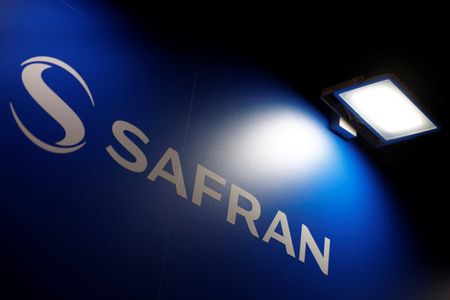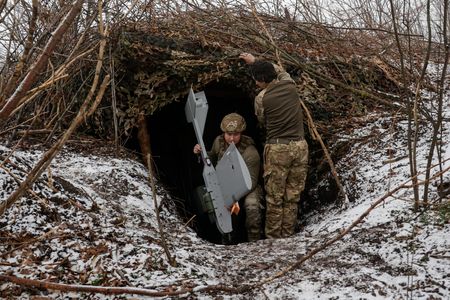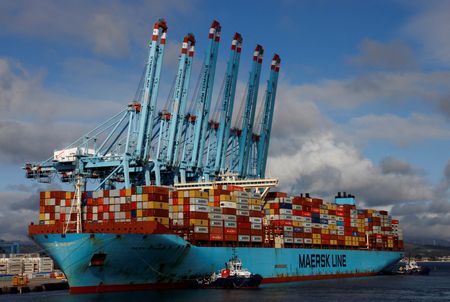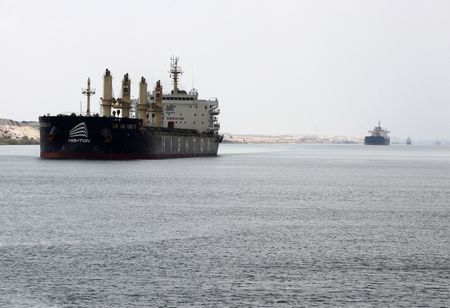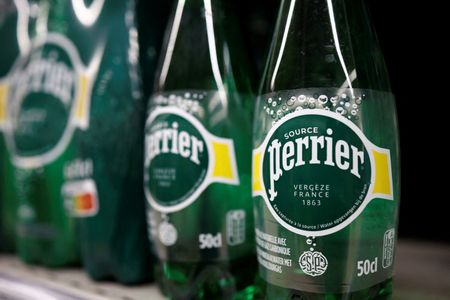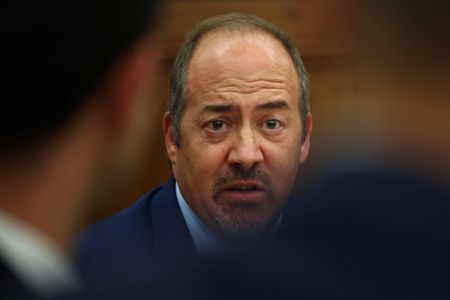By Tim Hepher
PARIS (Reuters) -French jet engine maker Safran raised its profit forecast for the year even as supply bottlenecks forced it to lower its revenue predictions on Friday, buoyed by demand for profitable services on planes that are already flying.
Disruption in industrial supply chains and an ongoing strike at Boeing have worsened a shortage of new aircraft for airlines, which are flying older planes for longer, meaning the repair shops where engine makers make most of their money are busy.
Safran predicted a 2024 recurring operating income of around 4.1 billion euros ($4.44 billion), up from a previous target close to 4.0 billion euros, citing a strong aftermarket so far this year.
The French company, which co-produces LEAP engines with GE Aerospace through their CFM joint venture, said nine-month revenues grew 17.4% to 19.686 billion euros led by Equipment and Defence activities and Aircraft Interiors.
Safran’s widely-watched civil aftermarket revenues rose 26.2% in the first nine months, with the group targeting mid-20s percentage growth for the full year.
Deliveries of LEAP engines improved in the third-quarter compared with the previous three months but remained hampered by the limited availability of high-pressure turbine blades, even though their production has been rising.
Safran joined its U.S.
partner in predicting 10% fewer LEAP deliveries in 2024, compared with a previous target of flat to 5% growth, and revised down its full-year revenue target to 27.1 billion euros from 27.4 billion.
CFM is the sole supplier of engines for the Boeing 737 MAX and competes with Pratt & Whitney to provide engines for the Airbus A320neo.
Safran Chief Executive Olivier Andries said Boeing was continuing to take and pay for deliveries of LEAP engines “for the moment” as the strike by machinists enters its sixth week.
The strike is, however, affecting Safran’s cabling business.
“We are paying close attention to the situation,” he told reporters.
“Boeing is continuing to take LEAP engines … but has asked some suppliers to stop delivering equipment during the strike, including cabling that Safran provides for the 737 MAX.”
Andries said he hoped the strike would end as soon as possible “in the interests of everyone”.
But he cautioned it would take longer than expected for the industry to adapt to higher production rates for Boeing jets once the strike ends.
“When things start up, there will be an impact on activity in 2025, which won’t be exactly what we imagined a few months ago,” he said.
Safran’s CFM venture with GE is the sole supplier of engines for the 737 MAX and Safran is a major supplier of other equipment including cables and cabin interiors.
Andries declined to comment on deliveries of aircraft at Airbus, which blamed delays at CFM among others for forcing it to lower its targets earlier this year.
Airbus planemaking CEO Christian Scherer said last week that LEAP engine supplies remained a key factor in meeting targets.
Andries said supply chains were improving but would remain strained in 2025, and Safran would continue to purchase parts and avoid “stop-go” patterns to soften the impact on suppliers.
Andries reaffirmed plans for the interiors business to break even this year after a sharp rise in deliveries of business class seats that have also been blamed for some plane delays.
Safran also became the latest company to lay out the cost of the temporary increase in corporation tax planned by the French government, saying it would have to pay 320 million to 340 million euros more in 2024.
Prime Minister Michel Barnier has announced targeted tax hikes for France’s biggest companies and wealthiest individuals to help narrow a gaping budget deficit.
($1 = 0.9243 euros)
(Reporting by Tim Hepher, editing by Tassilo Hummel and Tomasz Janowski)

